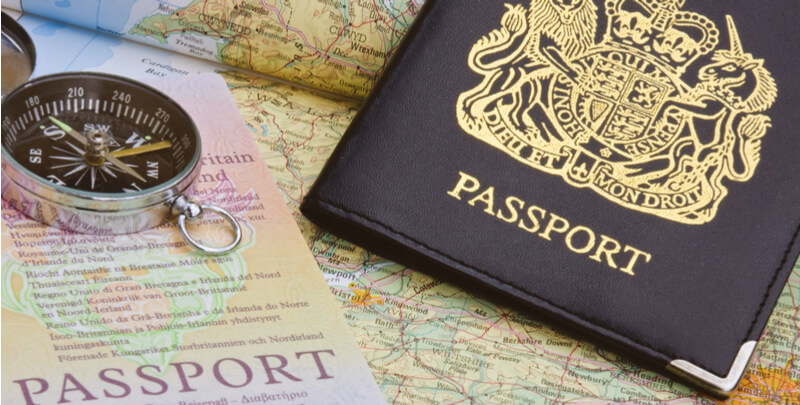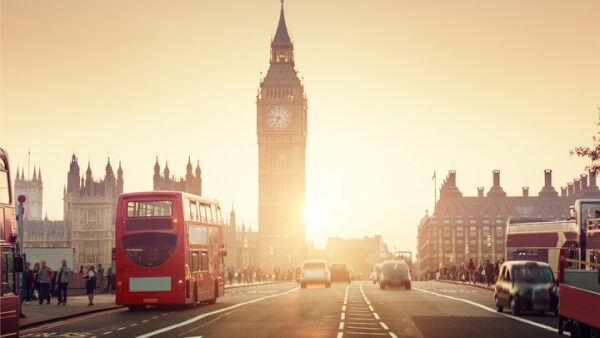Moving to the United Kingdom from Australia
The UK is one of the most popular destinations that Aussies, and other foreign nationals alike flock to see Buckingham palace, the Scottish highlands or the...

Moving to the UK comes with a lot of appeal; from exploring the country’s rich history to enjoying pub culture or exploring Europe on your 28 days of paid vacation, there’s no wonder so many permanent residents hope to make their ties with the country more official.
Regardless of whether you’re moving to the UK for a job, if you’re hoping to start a UK business, looking into a future with a UK citizen or if you’re just hoping for a change of pace, it’s important to understand the nuances of becoming a UK citizen.
This guide outlines all of the most important points and steps to keep in mind as you undertake the process of obtaining your UK citizenship.
Being a UK citizen comes with a ton of excellent benefits. For one, it means free access to the National Health Service (NHS). This cost-free health care system means you and your family are well protected in case of sickness or injury.
UK citizens also have full rights to voting in parliamentary and local elections, meaning they have some sway in the country’s general direction.
Most importantly, and unlike UK residents, UK citizens are allowed to hold UK passports, which means unrestricted travel between England, Scotland, Wales and Northern Ireland.
With just over 4.5 million Brits living abroad, and a reported 1.3 million of them residing in Europe, many UK citizens will be affected by the upcoming Brexit changes for British expats.
As the separation is made official, those citizens will no longer have the unhindered right to live in EU countries. Equally importantly, it means that when you become a UK citizen your passport won't serve as automatic access to Europe - you’ll be forced to undergo the same tourism procedures as other non-UK passport holders.
There are numerous ways to become a British citizen if you’re not born as one. The most common way is called naturalization.
You’re eligible to apply for naturalization if you’re 18 years of age or older, you’re of good character, have no serious criminal record and you’ll continue to live in the UK for a requisite period of time. You must also have met the knowledge requirements of the English language during the application process, including the ‘Life in the UK’ test requirements.
In most cases, you must also have lived in the UK for at least five years prior to your date of application, and have spent no more than 450 days outside of the UK during these five years. It’s also required that you’ll not have spent more than 90 days outside of the UK in the 12 months prior to your application.
If you’re a citizen of an EEA country, you must hold permanent residence status for the last 12 months and be able to provide a permanent residence document alongside your citizenship application.
If you’re from outside the European Economic Area (EEA), you must have had settlement (‘indefinite leave to remain’) in the UK for at least 12 months.
Finally, you must never have broken any immigration laws within the UK.
If you’re planning to move your family to the UK with you, you may apply on behalf of a child under 18, assuming they meet the other eligibility criteria. Children who are under 18 aren’t required to pass the Life in the UK exam.
Marrying a UK citizen does not automatically make you a citizen yourself. You’ll need to apply as the spouse of a British citizen, a process that does require some time and documentation to push through.
In order to meet the requirements, you must be 18 years of age or older, and be of “sound mind and good character.” You must also have met the residency requirement and met the English knowledge requirements, and you’re still required to take (and pass) the life in the UK exam.
You must also have been granted indefinite leave to stay in the UK – or permanent residence if you’re an European Economic Area (EEA) national and have been granted a permanent residence card.
Unless your spouse or civil partner works abroad for the UK government or an organization closely aligned to government, typically you must also have lived in the UK for at least three years prior to the date your application is received. During that time, you must have spent no more than 270 days outside of the UK in those three years and spent no more than 90 days outside of the UK in the past 12 months.
You must also not have broken any immigration laws while in the United Kingdom to be eligible.
There are three ways to apply for British citizenship by naturalization.
First, you can apply as an individual by completing the Form AN - application for naturalization as a British citizen. For more information, read the guidance notes and the requirements booklet, which tell you how to fill in the form and what other documents you need to provide.
You can also use the Nationality checking Service (NCS), which are run by local councils. Check if your local council has an NCS.
Finally, you can use an agent or representative from a private company. You can find out which agents or representatives are properly registered at the Office of the Immigration Services Commissioner (OISC).
Note: you must also provide your fingerprints and a photo as part of your application. This is known as biometric information and has a cost of £19.20.
You can find out more about applying for citizenship at the British government’s website.
As mentioned above, application for citizenship in the UK does require you to take and pass an exam, known as the “Life in the UK” test. The approval of your citizenship is contingent on completing the exam successfully.
Exams can be booked online, and must be scheduled at least three days in advance of the date you wish to take the test. Taking the test comes with a fee of £50.
All you need to make your exam booking is an email address, debit or credit card and an accepted form of ID (such as a passport or UK driver’s license).
If you need help with your booking, contact the Life in the UK Test Helpline at 0800 015 4245 between Monday to Friday, 8am to 4pm.
Note: the name you give on your test booking must be an exact match with the name on the ID you use to book the test. You must also include any middle names on the booking form or your test will be rejected and you won't be issued a refund.
You don’t need to take the test if you’re under the age of 18 or over the age of 65. If you’ve passed the test before when completing your settlement application, there’s no need to take the test again. Finally, if you have a long-term physical or mental condition, you're exempt from needing to take the test, however, you must provide either a form or letter from a doctor confirming your physical or mental condition.
Review the official handbook for the Life in the UK Test in preparation. You’ll have 45 minutes to answer 24 questions about British traditions and customs.
The UK permits dual citizenship (or dual nationality). This means that if you're applying for citizenship in the UK, you don't necessarily have to give up your home country's citizenship, or the citizenship of another country.
Although the UK may allow this, many other countries don't allow their citizens to have more than one citizenship. So in order to make sure what the situation is with other countries, you can check with their consulate or embassy in the UK before you apply for citizenship in the UK.
You can apply for a UK citizenship at your local UK consulate, or alternatively, you may send the application form, fees and necessary supporting documents to the following address:
UKVI
Department 1
The Capital
Liverpool L3 9PP
After you’ve applied for citizenship, you’ll get a letter confirming your application. The letter can take up to four weeks to arrive. A decision about your application will typically take six months, but can take longer.
Should you need to provide additional information to support your application, you’ll be notified and told where to send the necessary documents. In some cases, you may be asked to attend an interview. It’s possible to speak with an interpreter if necessary, however, inability to speak fluent English may affect your eligibility.
Upon receiving approval for citizenship, if you’re over the age of 18, you’ll be invited to book a place at a citizenship ceremony. Typically you’re allowed to invite two guests to attend the ceremony with you, and there’s a ceremony fee of £80. Your local council organizes citizenship ceremonies, and you can ask for a private ceremony if you wish. You can book your citizenship ceremony with your council close to where you live. During the ceremony itself, you’ll make an oath of allegiance and pledge promising to respect the rights, freedoms and laws of the United Kingdom.
At the end of the ceremony, you’ll be presented with your certificate of British citizenship and a welcome package. You may also have the opportunity to purchase photographs or videos of the event, which are sold at certain local councils. If you’re not living in the UK, you can ask to have your ceremony at the embassy or consulate of the country you're currently living in. However, if you’ll be returning to the UK within a few months, you may be asked to postpone your ceremony until your return.
After you’ve received your certificate of British citizenship, you must send your biometric residence permit back to the Home Office within five working days of attending your citizenship ceremony or physically receiving your certificate.
Proper procedure involves cutting your biometric residence permit (BRP) into four pieces and sealing it in a windowless envelope. Include a note indicating that you’re returning your permit because you’ve become a citizen. The note needs to include your name, date of birth and the document number (located on the front of the card).
Note: you’ll be fined up to £1,000 if you don’t return your permit within five working days.
The application fees vary greatly depending on the application type. For standard naturalization applications, the cost is £1282. For a complete list of types of applications with associated fees, consult the gov.uk website. In most cases, you van pay the fee for your visa application online.
You can apply for a British passport if you have British nationality. However, there are some extenuating circumstances where your application can be refused or your existing passport can be retained.
You may apply for a British passport if you’re a:
Note: Having British nationality doesn’t guarantee you a passport.
Your eligibility and entitlement to a British passport will be considered when you apply. Passports belong to the government and can be cancelled or withdrawn at any time.
If you’re not already familiar with money and banks in the UK you’ll want to do a bit of research or, if you haven’t already, make sure to open a bank account to help cut down on costs.
Good luck on becoming a UK citizen!
*Please see terms of use and product availability for your region or visit Wise fees and pricing for the most up to date pricing and fee information.
This publication is provided for general information purposes and does not constitute legal, tax or other professional advice from Wise Payments Limited or its subsidiaries and its affiliates, and it is not intended as a substitute for obtaining advice from a financial advisor or any other professional.
We make no representations, warranties or guarantees, whether expressed or implied, that the content in the publication is accurate, complete or up to date.

The UK is one of the most popular destinations that Aussies, and other foreign nationals alike flock to see Buckingham palace, the Scottish highlands or the...

Are you pregnant? Congratulations - this is one of the most exciting periods of your life. But if you’re living abroad as an expat, visitor, or non-resident...

If you’re expecting a new baby, you’re probably experiencing a range of emotions - excitement, apprehension, joy, and confusion. If you’re a visitor or expat...

Home to some of the world’s best museums, restaurants, sports teams, and universities, there’s no doubt that moving to the UK to work, study, or just to have...

The United Kingdom is rich with history and tradition. A destination wedding in the UK is sure to be an extraordinary event for you and your loved ones. From...

The UK is the fifth largest economy on the planet, with a highly developed technology and service industry. London is also the world’s leading financial...